Business Books to Watch in November 2017
November 01, 2017
There are plenty of great books being released this month that are deserving of attention. These are twenty we'll be giving some of ours to.
In order of their release date, these are 20 books we'll be digging further into this month.
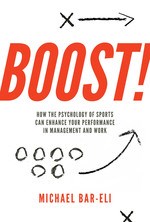 Boost!: How the Psychology of Sports Can Enhance your Performance in Management and Work by Michael Bar-Eli, Oxford University Press
Boost!: How the Psychology of Sports Can Enhance your Performance in Management and Work by Michael Bar-Eli, Oxford University Press
Mental preparedness and psychological awareness are the keys to thriving in any environment.
To perform better in any situation—in your career, hobbies, relationships, or in any facet of your life—it is critical to develop psychological skills, which, just like physical abilities, can be taught, learned, and practiced. Both as individuals and as groups, we can tone these psychological skills and use them to heighten awareness, foster talents and technical abilities, and reach peak performance.
Few understand the importance of psychological skills better than the internationally recognized professor Michael Bar-Eli. As both a sports and organizational psychologist for more than 35 years, Bar-Eli has not only researched the science of performance but has also worked directly with elite athletes, coaches, and teams to help them improve their success on the court or field. Boost! takes the lessons he's learned from sports psychology and translates them for leaders and managers at any stage in their career. With prescriptive advice, Bar-Eli illustrates how anyone can apply these lessons to better support and inspire co-workers and employees and create a sustainable, successful working environment and business.
Boost! breaks down the complex behavioral science of getting ahead. Through original scientific research, unique case studies, and anecdotes from the world of sports and beyond, Bar-Eli explains the psychological underpinnings of human behavior and how we can harness this knowledge to perform at our highest levels, succeeding in our careers and personal lives.
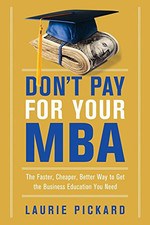 Don't Pay for Your MBA: The Faster, Cheaper, Better Way to Get the Business Education You Need by Laurie Pickard, AMACOM
Don't Pay for Your MBA: The Faster, Cheaper, Better Way to Get the Business Education You Need by Laurie Pickard, AMACOM
Who needs a mountain of debt?
Each year, the nation's top business schools are flooded with applications from people eager to pursue their MBA dreams. But those aspirations come at a steep price. According to U.S. News and World Report, the average debt load for graduates of NYU's Stern School of Business, MIT's Sloan School of Management, and other top business schools exceeds $100,000.
Like most, author Laurie Pickard couldn't shoulder that. But she faced a dilemma: despite two degrees and a Peace Corps stint, she needed a business education to land her dream job in international development. She decided to take her education into her own hands, and found that some of those same prestigious business schools offer MOOCs (massive online open courses) for low or even no cost. By picking the right classes from the best schools, she gained the skills—without all the debt.
In Don't Pay for Your MBA, Pickard shows self-starters, career changers, and budding entrepreneurs how to navigate the expanding universe of online education. Building on her popular No-Pay MBA blog, Pickard reveals how to:
- Define your goals and tailor a curriculum that works for you
- Master the language of business
- Build a strong network
- Choose a concentration and deepen your expertise
- Showcase your nontraditional education in a way that attracts offers
Self-directed learning fills gaps in your training, positions you for promotions, and opens up new opportunities. Why pay exorbitant tuition when you can MOOC your way to success?
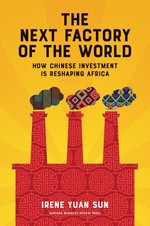 The Next Factory of the World: How Chinese Investment Is Reshaping Africa by Irene Yuan Sun, Harvard Business Review Press
The Next Factory of the World: How Chinese Investment Is Reshaping Africa by Irene Yuan Sun, Harvard Business Review Press
China is now the biggest foreign player in Africa.
Will Africa be the world’s next hub of manufacturing? China is answering in the affirmative and investing accordingly. This book dispels the notion that this crucial story is merely about China’s exploitation of Africa’s resources, illuminating deep questions about our own, Western approach to development, and the implications for the future of manufacturing.
China is Africa's largest trade partner, the largest infrastructure financier, and the fastest-growing source of foreign direct investment. Chinese entrepreneurs are flooding into the continent, investing in long-term assets such as factories and heavy equipment.
Considering Africa's difficult history of colonialism, one might suspect that China's activity there is another instance of a foreign power exploiting resources. But as author Irene Yuan Sun vividly shows in this remarkable book, it is really a story about resilient Chinese entrepreneurs building in Africa what they so recently learned to build in China—a global manufacturing powerhouse.
The fact that China sees Africa not for its poverty but for its potential wealth is a striking departure from the attitude of the West, particularly that of the United States. Despite fifty years of Western aid programs, Africa still has more people living in extreme poverty than any other region in the world. Those who are serious about raising living standards across the continent know that another strategy is needed.
Chinese investment gives rise to a tantalizing possibility: that Africa can industrialize in the coming generation. With a manufacturing-led transformation, Africa would be following in the footsteps of the United States in the nineteenth century, Japan in the early twentieth, and the Asian Tigers in the late twentieth. Many may consider this an old-fashioned way to develop, but as Sun argues, it's the only one that's proven to raise living standards across entire societies in a lasting way. And with every new Chinese factory boss setting up machinery and hiring African workers—and managers—that possibility becomes more real for Africa.
With fascinating and moving human stories along with incisive business and economic analysis, The Next Factory of the World will make you rethink both China's role in the world and Africa's future in the globalized economy.
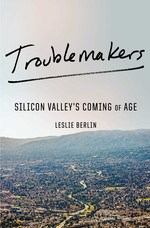 Troublemakers: Silicon Valley’s Coming of Age by Leslie Berlin, Simon & Schuster
Troublemakers: Silicon Valley’s Coming of Age by Leslie Berlin, Simon & Schuster
The richly told narrative of the Silicon Valley generation that launched five major high-tech industries in seven years, laying the foundation for today’s technology-driven world.
At a time when the five most valuable companies on the planet are high-tech firms and nearly half of Americans say they cannot live without their cell phones, Troublemakers reveals the untold story of how we got here. This is the gripping tale of seven exceptional men and women, pioneers of Silicon Valley in the 1970s and early 1980s. Together, they worked across generations, industries, and companies to bring technology from Pentagon offices and university laboratories to the rest of us. In doing so, they changed the world.
In Troublemakers, historian Leslie Berlin introduces the people and stories behind the birth of the Internet and the microprocessor, as well as Apple, Atari, Genentech, Xerox PARC, ROLM, ASK, and the iconic venture capital firms Sequoia Capital and Kleiner Perkins Caufield & Byers. In the space of only seven years and thirty-five miles, five major industries—personal computing, video games, biotechnology, modern venture capital, and advanced semiconductor logic—were born.
During these same years, the first ARPANET transmission came into a Stanford lab, the university began licensing faculty innovations to businesses, and the Silicon Valley tech community began mobilizing to develop the lobbying clout and influence that have become critical components of modern American politics. In other words, these were the years when one of the most powerful pillars of our modern innovation and political systems was first erected.
Featured among well-known Silicon Valley innovators like Steve Jobs, Regis McKenna, Larry Ellison, and Don Valentine are Mike Markkula, the underappreciated chairman of Apple who owned one-third of the company; Bob Taylor, who kick-started the Arpanet and masterminded the personal computer; software entrepreneur Sandra Kurtzig, the first woman to take a technology company public; Bob Swanson, the cofounder of Genentech; Al Alcorn, the Atari engineer behind the first wildly successful video game; Fawn Alvarez, who rose from an assembler on a factory line to the executive suite; and Niels Reimers, the Stanford administrator who changed how university innovations reach the public. Together, these troublemakers rewrote the rules and invented the future.
 Obroni and the Chocolate Factory: An Unlikely Story of Globalization and Ghana's First Gourmet Chocolate Bar by Steven Wallace, Skyhorse Publishing
Obroni and the Chocolate Factory: An Unlikely Story of Globalization and Ghana's First Gourmet Chocolate Bar by Steven Wallace, Skyhorse Publishing
How One Entrepreneur Took On Big Cocoa and Won. Sort Of.
What country makes the best chocolate? Most people would answer "Switzerland," or, if they're discerning, "Belgium" or "France." But, how many cocoa trees grow in Zurich? Lyon? Antwerp? Shouldn't the country known for growing the best cocoa beans be the one that makes the best chocolate? So, captivated by theories of international trade but with precious little knowledge of cocoa or chocolate, Steven Wallace set out to build the Omanhene Cocoa Bean Company in Ghana—a country renowned for its cocoa and where Wallace spent part of his youth—in a quest to produce the world's first export-ready, single-origin chocolate bar. What followed would be the true story of an obroni—white person—from Wisconsin taking on the ultimate entrepreneurial challenge.
Written with sensitivity and devastating self-awareness, Obroni and the Chocolate Factory is Steven's chaotic, fascinating, and bemusing journey to create a successful international business that aspired to do a bit of good in the world. This book is at once a penetrating business memoir and a story about imagining globalism done right. Wallace's picaresque journey takes him to Ghana's residence for the head of state, to the Amsterdam offices of a secretive international cocoa conglomerate, and face-to-face with key figures in the sharp-elbowed world of global trade and geopolitics. Along the way he'll be forced to deal with bureaucratic roadblocks, a legacy of colonialism, corporate intrigue, inscrutable international politics, a Bond-esque villain nemesis, and constant uncertainty about whether he'll actually pull it off. This rollicking love letter to both Ghana and the world of business is a rare glimpse into the mind of an unusually literate and articulate entrepreneur.
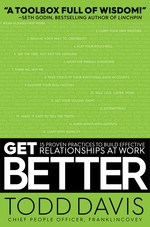 Get Better: 15 Proven Practices to Build Effective Relationships at Work by Todd Davis, Simon & Schuster
Get Better: 15 Proven Practices to Build Effective Relationships at Work by Todd Davis, Simon & Schuster
A practical guide for anyone looking to create a competitive advantage in any size and type of organization by building effective relationships—from the performance improvement experts at FranklinCovey.
In Get Better: 15 Proven Practices to Build Effective Relationships, FranklinCovey’s Chief People Officer Todd Davis explains that an organization’s greatest asset isn’t its people; rather, it’s the relationships between its people that is the greatest predictor of personal effectiveness. In the end, employees’ ability to build and sustain great relationships is an organization’s ultimate competitive advantage.
Ideal for professional people at all levels of business, government, and education, from the front-line supervisor to the president and CEO, Davis describes the most common relationship pitfalls that negatively affect personal careers and organizational results. Get Better draws on real-world stories in an approachable, engaging style—and Davis’s thirty-year experience observing, leading, and coaching others brings those relatable experiences to life. He identifies fifteen proven practices that influential leaders at any level of an organization use to take ownership of their work, improve the quality of interactions with others, and master the skills of effective relationships.
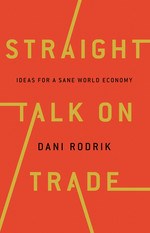 Straight Talk on Trade: Ideas for a Sane World Economy by Dani Rodrik, Princeton University Press
Straight Talk on Trade: Ideas for a Sane World Economy by Dani Rodrik, Princeton University Press
An honest discussion of free trade and how nations can sensibly chart a path forward in today’s global economy.
Not so long ago the nation-state seemed to be on its deathbed, condemned to irrelevance by the forces of globalization and technology. Now it is back with a vengeance, propelled by a groundswell of populists around the world. In Straight Talk on Trade, Dani Rodrik, an early and outspoken critic of economic globalization taken too far, goes beyond the populist backlash and offers a more reasoned explanation for why our elites’ and technocrats’ obsession with hyper-globalization made it more difficult for nations to achieve legitimate economic and social objectives at home: economic prosperity, financial stability, and equity.
Rodrik takes globalization’s cheerleaders to task, not for emphasizing economics over other values, but for practicing bad economics and ignoring the discipline’s own nuances that should have called for caution. He makes a case for a pluralist world economy where nation-states retain sufficient autonomy to fashion their own social contracts and develop economic strategies tailored to their needs. Rather than calling for closed borders or defending protectionists, Rodrik shows how we can restore a sensible balance between national and global governance. Ranging over the recent experiences of advanced countries, the eurozone, and developing nations, Rodrik charts a way forward with new ideas about how to reconcile today’s inequitable economic and technological trends with liberal democracy and social inclusion.
Deftly navigating the tensions among globalization, national sovereignty, and democracy, Straight Talk on Trade presents an indispensable commentary on today’s world economy and its dilemmas, and offers a visionary framework at a critical time when we need it most.
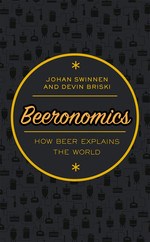 Beeronomics: How Beer Explains the World by Johan Swinnen & Devin Briski, Oxford University Press
Beeronomics: How Beer Explains the World by Johan Swinnen & Devin Briski, Oxford University Press
From prompting a transition from hunter-gatherer, to an agrarian lifestyle in ancient Mesopotamia, to bankrolling Britain's imperialist conquests, strategic taxation and the regulation of beer has played a pivotal role throughout history. Beeronomics: How Beer Explains the World tells these stories, and many others, whilst also exploring the key innovations that propelled the industrialization and consolidation of the beer market.
At the same time when mega-mergers in the brewing industry are creating huge transnationals selling their beer across the globe, the craft beer movement in America and Europe has brought the rich history of ancient brewing techniques to the forefront in recent years. But less talked about is the economic influence of this beverage on the world and the myriad ways it has shaped the course of history. Beeronomics covers world history through the lens of beer, exploring the common role that beer taxation has played throughout and providing context for recognizable brands and consumer trends and tastes.
Beeronomics examines key developments that have moved the brewing industry forward. Its most ubiquitous ingredient, hops, was used by the Hanseatic League to establish the export dominance of Hamburg and Bremen in the sixteenth century. During the late nineteenth century, bottom-fermentation led to the spread of industrial lager beer. Industrial innovations in bottling, refrigeration, and TV advertising paved the way for the consolidation and market dominance of major macrobreweries like Anheuser Busch in America and Artois Brewery in Belgium during the twentieth century. We're now in the era of global integration—one multinational AB InBev, claims 46% of all beer profits—but there's a counterrevolution afoot of small, independent craft breweries in America, Belgium and around the world. Beeronomics surveys these trends, giving context to why you see which brands and styles on shelves at your local supermarket or on tap at the nearby pub.
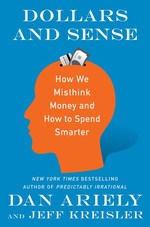 Dollars and Sense: How We Misthink Money and How to Spend Smarter by Dr. Dan Ariely & Jeff Kreisler, Harper
Dollars and Sense: How We Misthink Money and How to Spend Smarter by Dr. Dan Ariely & Jeff Kreisler, Harper
Blending humor and behavioral economics, the New York Times bestselling author of Predictably Irrational delves into the truly illogical world of personal finance to help people better understand why they make bad financial decisions, and gives them the knowledge they need to make better ones.
Why does paying for things often feel like it causes physical pain?
Why does it cost you money to act as your own real estate agent?
Why are we comfortable overpaying for something now just because we’ve overpaid for it before?
In Dollars and Sense, world renowned economist Dan Ariely answers these intriguing questions and many more as he explains how our irrational behavior often interferes with our best intentions when it comes to managing our finances. Partnering with financial comedian and writer Jeff Kreisler, Ariely takes us deep inside our minds to expose the hidden motivations that are secretly driving our choices about money.
Exploring a wide range of everyday topics—from credit card debt and household budgeting to holiday sales—Ariely and Kreisler demonstrate how our ideas about dollars and cents are often wrong and cost us more than we know. Mixing case studies and anecdotes with tangible advice and lessons, they cut through the unconscious fears and desires driving our worst financial instincts and teach us how to improve our money habits.
Fascinating, engaging, funny, and essential, Dollars and Sense is a sound investment, providing us with the practical tools we need to understand and improve our financial choices, save and spend smarter, and ultimately live better.
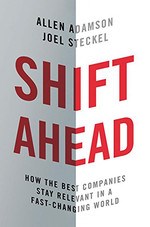 Shift Ahead: How the Best Companies Stay Relevant in a Fast-Changing World by Allen Adamson & Joel Steckel, AMACOM
Shift Ahead: How the Best Companies Stay Relevant in a Fast-Changing World by Allen Adamson & Joel Steckel, AMACOM
The future is closer than you think.
In a world that’s changing faster and more furiously than ever, the ability to shift focus is critical.
Why is it that some organizations can continually evolve to meet the times and the marketplace, and others can’t? How do some businesses recognize the right moment to shift, and others, ruefully, only after it’s too late? Packed with insightful interviews, Shift Ahead offers a smart, calculated approach to knowing when to change course and how to pull it off.
The book brings every internal and external factor into view: competitors, risks, culture, finances, and more. And it taps success stories and cautionary tales—including HBO, Adobe, BlackBerry, National Geographic, NYU, Microsoft, Kodak, and P&G—to explain how to:
- Spot warning signs that it’s time for reinvention
- Overcome obstacles in the way of future goals
- Maintain authenticity when changing gears
- Execute a bold change seamlessly
To stay competitive, you must shift; to stay credible, you must focus. Shift Ahead turns this difficult maneuver into a straightforward strategy.
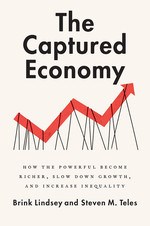 The Captured Economy: How the Powerful Enrich Themselves, Slow Down Growth, and Increase Inequality by Brink Lindsey & Steven Teles, Oxford University Press
The Captured Economy: How the Powerful Enrich Themselves, Slow Down Growth, and Increase Inequality by Brink Lindsey & Steven Teles, Oxford University Press
For years, America has been plagued by slow economic growth and increasing inequality.
Yet, economists have long taught that there is a tradeoff between equity and efficiency—that is, between making a bigger pie and dividing it more fairly. That is why our current predicament is so puzzling: today, we are faced with both a stagnating economy and sky-high inequality.
In The Captured Economy, Brink Lindsey and Steven M. Teles identify a common factor behind these twin ills: breakdowns in democratic governance that allow wealthy special interests to capture the policymaking process for their own benefit. They document the proliferation of regressive regulations that redistribute wealth and income up the economic scale while stifling entrepreneurship and innovation. When the state entrenches privilege by subverting market competition, the tradeoff between equity and efficiency no longer holds.
Over the past four decades, new regulatory barriers have worked to shield the powerful from the rigors of competition, thereby inflating their incomes—sometimes to an extravagant degree. Lindsey and Teles detail four of the most important cases: subsidies for the financial sector's excessive risk taking, overprotection of copyrights and patents, favoritism toward incumbent businesses through occupational licensing schemes, and the NIMBY-led escalation of land use controls that drive up rents for everyone else.
Freeing the economy from regressive regulatory capture will be difficult. Lindsey and Teles are realistic about the chances for reform, but they offer a set of promising strategies to improve democratic deliberation and open pathways for meaningful policy change. An original and counterintuitive interpretation of the forces driving inequality and stagnation, The Captured Economy will be necessary reading for anyone concerned about America's mounting economic problems and the social tensions they are sparking.
 The Friendly Orange Glow: The Untold Story of the PLATO System and the Dawn of Cyberculture by Brian Dear, Pantheon
The Friendly Orange Glow: The Untold Story of the PLATO System and the Dawn of Cyberculture by Brian Dear, Pantheon
At a time when Steve Jobs was only a teenager and Mark Zuckerberg wasn’t even born, a group of visionary engineers and designers—some of them only high school students—in the late 1960s and 1970s created a computer system called PLATO, which was light-years ahead in experimenting with how people would learn, engage, communicate, and play through connected computers. Not only did PLATO engineers make significant hardware breakthroughs with plasma displays and touch screens but PLATO programmers also came up with a long list of software innovations: chat rooms, instant messaging, message boards, screen savers, multiplayer games, online newspapers, interactive fiction, and emoticons. Together, the PLATO community pioneered what we now collectively engage in as cyberculture. They were among the first to identify and also realize the potential and scope of the social interconnectivity of computers, well before the creation of the internet. PLATO was the foundational model for every online community that was to follow in its footsteps.
The Friendly Orange Glow is the first history to recount in fascinating detail the remarkable accomplishments and inspiring personal stories of the PLATO community. The addictive nature of PLATO both ruined many a college career and launched pathbreaking multimillion-dollar software products. Its development, impact, and eventual disappearance provides an instructive case study of technological innovation and disruption, project management, and missed opportunities. Above all, The Friendly Orange Glow at last reveals new perspectives on the origins of social computing and our internet-infatuated world.
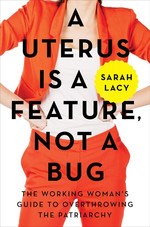 A Uterus Is a Feature, Not a Bug: The Working Woman's Guide to Overthrowing the Patriarchy by Sarah Lacy, Harper Business
A Uterus Is a Feature, Not a Bug: The Working Woman's Guide to Overthrowing the Patriarchy by Sarah Lacy, Harper Business
A rally cry for working mothers everywhere that demolishes the “distracted, emotional, weak” stereotype and definitively shows that these professionals are more focused, decisive, and stronger than any other force.
Working mothers aren’t a liability. They are assets you—and every manager and executive—wants in your company, in your investment portfolio, and in your corner.
There is copious academic research showing the benefits of working mothers on families and the benefits to companies who give women longer and more flexible parental leave. There are even findings that demonstrate women with multiple children actually perform better at work than those with none or one.
Yet despite this concrete proof that working mothers are a lucrative asset, they still face the “Maternal Wall”—widespread unconscious bias about their abilities, contributions, and commitment. Nearly eighty percent of women are less likely to be hired if they have children—and are half as likely to be promoted. Mothers earn an average $11,000 less in salary and are held to higher punctuality and performance standards. Forty percent of Silicon Valley women said they felt the need to speak less about their family to be taken more seriously. Many have been told that having a second child would cost them a promotion.
Fortunately, this prejudice is slowly giving way to new attitudes, thanks to more women starting their own businesses and companies like Netflix, Facebook, Apple, and Google implementing more parent-friendly policies. But the most important barrier to change isn’t about men. Women must rethink the way they see themselves after giving birth. As entrepreneur Sarah Lacy makes clear in this cogent, persuasive analysis and clarion cry, the strongest, most lucrative, and most ambitious time of a woman’s career may easily be after she sees a plus sign on a pregnancy test.
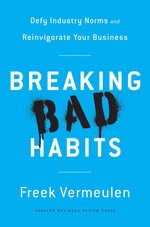 Breaking Bad Habits: Defy Industry Norms and Reinvigorate Your Business by Freek Vermeulen, Harvard Business Review Press
Breaking Bad Habits: Defy Industry Norms and Reinvigorate Your Business by Freek Vermeulen, Harvard Business Review Press
Have you ever wondered why most newspapers are so large? Or why management consultants work such long hours? Or why hotels still insist on having check-in desks? Ask anyone in these industries, and their answer will be the same: "That’s the way we’ve always done it."
"Best practices" may be widespread, but that doesn't mean they're effective. In many instances the opposite is true: best practices can be outdated, harmful, and a hindrance to innovation. These bad practices are all too common in organizations, and managers and executives can be blind to their pernicious effects. Since they've worked in the past, or have been adopted with success by other firms, their purpose or effectiveness is rarely questioned. As a consequence, these practices spread and persist.
In Breaking Bad Habits, Freek Vermeulen, a strategist with a keen eye for the absurd, offers the tools to identify these practices and rid them from your organization. And, most of all, he presents a compelling case for how eliminating popular but outworn ideas, processes, and strategies can create new opportunities for innovation and growth.
Brimming with examples of norm-defying organizations in an eclectic range of industries—including IVF clinics, hotels, newspapers, and a famous London theater—Breaking Bad Habits will make you rethink your long-held beliefs about industry norms while encouraging you to reinvigorate your business by breaking out of the status quo.
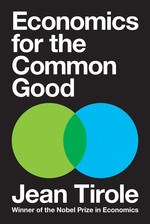 Economics for the Common Good by Jean Tirole, Princeton University Press
Economics for the Common Good by Jean Tirole, Princeton University Press
From Nobel Prize–winning economist Jean Tirole, a bold new agenda for the role of economics in society.
When Jean Tirole won the 2014 Nobel Prize in Economics, he suddenly found himself being stopped in the street by complete strangers and asked to comment on issues of the day, no matter how distant from his own areas of research. His transformation from academic economist to public intellectual prompted him to reflect further on the role economists and their discipline play in society. The result is Economics for the Common Good, a passionate manifesto for a world in which economics, far from being a "dismal science," is a positive force for the common good.
Economists are rewarded for writing technical papers in scholarly journals, not joining in public debates. But Tirole says we urgently need economists to engage with the many challenges facing society, helping to identify our key objectives and the tools needed to meet them.
To show how economics can help us realize the common good, Tirole shares his insights on a broad array of questions affecting our everyday lives and the future of our society, including global warming, unemployment, the post-2008 global financial order, the euro crisis, the digital revolution, innovation, and the proper balance between the free market and regulation.
Providing a rich account of how economics can benefit everyone, Economics for the Common Good sets a new agenda for the role of economics in society.
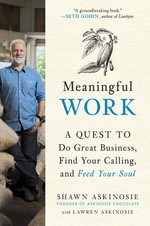 Meaningful Work: A Quest to Do Great Business, Find Your Calling, and Feed Your Soul by Shawn Askinosie with Lawren Askinosie, TarcherPerigee
Meaningful Work: A Quest to Do Great Business, Find Your Calling, and Feed Your Soul by Shawn Askinosie with Lawren Askinosie, TarcherPerigee
The founder of award-winning chocolatier Askinosie Chocolate shows readers how he discovered the secret to purposeful work—and how we can too, no matter what work we do.
Askinosie Chocolate is a small batch, award-winning chocolate manufacturer with seventeen full-time employees, sourcing 100% of their beans directly from cocoa farmers on four continents. The company is the only chocolate maker to use direct trade and to profit share with farmers in Ecuador, Honduras, the Philippines, and Tanzania. The company also feeds 1,600 children every day without any outside donations.
But twenty years ago, Shawn Askinosie was a successful defense lawyer trying his first murder death penalty case that would later go on to become a Dateline special. Burnt out in this field, he sought to emulate Trappist monks, who focused on “being” rather than “doing.” In this book, Askinosie shares his hard-won insights into doing work that reflects his values. His business goals relate not to getting bigger, but getting better at staying small—a concept he calls reverse scale. He also shares his business visioning tool that he applies at every level of his company. Askinosie shows us that everyone has the capacity to find meaning in their work and be a positive force for good.
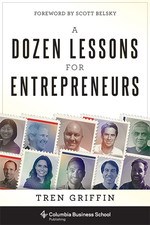 A Dozen Lessons for Entrepreneurs by Tren Griffin, Columbia University Press
A Dozen Lessons for Entrepreneurs by Tren Griffin, Columbia University Press
From profiles and interviews with the world's leading venture capitalists and high-profile coaches of business founders, A Dozen Lessons distills a set of bedrock methods for approaching business questions and creating value. The veteran business writer Tren Griffin takes the reader through the investment philosophies of VC luminaries such as Bill Gurley of Benchmark Capital, Marc Andreesen and Ben Horowitz of Andreesen Horowitz, and Jenny Lee of GGV Capital to draw out a set of guiding principles that successful businesses follow.
With insight and verve, Griffin argues that venture capital is, at a fundamental level, a service business that depends hugely on "human factors." Griffin suggests that, among a number of common features, these investors succeeded because of their sense of hustle, keen judgment, hard work, and good luck. But most of all, they share a deep love of building businesses that goes beyond financial considerations. Griffin reminds us that success is a multidimensional phenomenon requiring talented people, customer traction, productive partnerships, and brand value. These features amplify one another, with incremental success attracting more attention, talent, and investment.
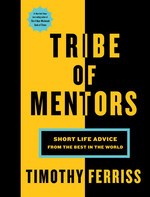 Tribe of Mentors: Short Life Advice from the Best in the World by Timothy Ferriss, Houghton Mifflin Harcourt
Tribe of Mentors: Short Life Advice from the Best in the World by Timothy Ferriss, Houghton Mifflin Harcourt
We All Need Mentors. Here Are More than 100 of the World’s Best.
When facing life’s questions, who do you turn to for advice? We all need mentors, particularly when the odds seem stacked against us. To find his own, four-time #1 best-selling author Tim Ferriss tracked down more than 100 eclectic experts to help him, and you, navigate life. Through short, action-packed profiles, he shares their secrets for success, happiness, meaning, and more. No matter the challenge or opportunity, something in these pages can help.
You will learn:
- The three books legendary investor Ray Dalio recommends most often
- Lessons and tips from elite athletes like Maria Sharapova, Kelly Slater, Dara Torres, Tony Hawk, Dan Gable, and more
- How and why Facebook co-founder Dustin Moskovitz says no to most incoming requests
- The mental models of poker phenoms Daniel Negreanu, Annie Duke, Fedor Holz, and Liv Boeree
- The meditation and mindfulness practices of David Lynch, Jimmy Fallon, Sharon Salzberg, Rick Rubin, Richa Chadha, Sarah Elizabeth Lewis, and others
- The high-school loss that motivated actor Terry Crews for life . . . and how you can use the lesson
- Why TED curator Chris Anderson thinks “pursue your passion” is terrible advice
- Why renowned designer Debbie Millman believes in therapy but not in work-life balance
- How Yuval Noah Harari's Sapiens went from repeated rejections to global mega-bestseller
- The new beliefs, behaviors, and habits that have most helped cryptocurrency icons (founders of Ethereum, Zcash, etc.) in the last five years
- Why Arianna Huffington recommends that you regularly scramble apps on your phone
- The “bar complex” exercise that keeps country star Tim McGraw young
- Why bestselling author Steven Pressfield believes college students should drive trucks and become cowboys
- Why comedian Patton Oswalt wishes at least one catastrophic failure on anyone in the arts
- Astrophysicist Janna Levin’s unique reframe that helps her see obstacles as opportunities
- Why actor Ben Stiller likes to dunk his head in a bucket of ice in the morning
- Why Dropbox co-founder Drew Houston’s cheat sheet for his younger self would include a tennis ball, a circle, and the number 30,000.
Other mentors include Neil Gaiman, Ashton Kutcher, Dita Von Teese, Marc Benioff, Evan Williams, Brandon Stanton, Esther Perel, Darren Aronofsky, Steve Aoki, Joseph Gordon-Levitt, Stephanie McMahon, Craig Newmark, Gretchen Rubin, Bear Grylls, Laura Walker, Mr. Money Mustache (Pete Adeney), Linda Rottenberg, Jesse Williams, and many more.
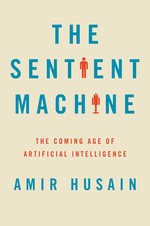 The Sentient Machine: The Coming Age of Artificial Intelligence by Amir Husain, Simon & Schuster
The Sentient Machine: The Coming Age of Artificial Intelligence by Amir Husain, Simon & Schuster
In the tradition of Michio Kaku’s The Future of the Mind, acclaimed technologist and inventor Amir Husain answers the universal question of how we can live amidst the coming age of sentient machines and artificial intelligence—and not only survive, but thrive.
The future is now. Artificial “machine” intelligence is playing an ever-greater role in our society. We are already using cruise control in our cars, automatic checkout at the drugstore, and are unable to live without our smartphones. The discussion around AI is largely polarized; people think either machines will solve all problems for everyone, or they will lead us down a dark, dystopian path into total human irrelevance. Regardless of what you believe, the idea that we might bring forth intelligent creation can be intrinsically frightening. But what if our greatest role as humans so far is that of creators?
Amir Husain, a brilliant inventor and computer scientist argues that we are on the cusp of writing our next, and greatest, creation myth. It is the dawn of a new form of intellectual diversity, one that we need to embrace in order to advance the state of the art in many critical fields, including security, resource management, finance, and energy. In The Sentient Machine, he addresses broad existential questions surrounding the coming of AI: Why are we valuable? What can we create in this world? How are we intelligent? What constitutes progress for us? And how might we fail to progress? Husain boils down complex computer science and AI concepts into clear, plainspoken language and draws from a wide variety of cultural and historical references to illustrate his points. Ultimately, he challenges many of our societal norms and upends assumptions we hold about “the good life.”
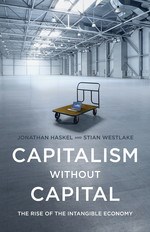 Capitalism without Capital: The Rise of the Intangible Economy by Jonathan Haskel & Stian Westlake, Princeton University Press
Capitalism without Capital: The Rise of the Intangible Economy by Jonathan Haskel & Stian Westlake, Princeton University Press
The first comprehensive account of the growing dominance of the intangible economy.
Early in the twenty-first century, a quiet revolution occurred. For the first time, the major developed economies began to invest more in intangible assets, like design, branding, R&D, and software, than in tangible assets, like machinery, buildings, and computers. For all sorts of businesses, from tech firms and pharma companies to coffee shops and gyms, the ability to deploy assets that one can neither see nor touch is increasingly the main source of long-term success.
But this is not just a familiar story of the so-called new economy. Capitalism without Capital shows that the growing importance of intangible assets has also played a role in some of the big economic changes of the last decade. The rise of intangible investment is, Jonathan Haskel and Stian Westlake argue, an underappreciated cause of phenomena from economic inequality to stagnating productivity.
Haskel and Westlake bring together a decade of research on how to measure intangible investment and its impact on national accounts, showing the amount different countries invest in intangibles, how this has changed over time, and the latest thinking on how to assess this. They explore the unusual economic characteristics of intangible investment, and discuss how these features make an intangible-rich economy fundamentally different from one based on tangibles.
Capitalism without Capital concludes by presenting three possible scenarios for what the future of an intangible world might be like, and by outlining how managers, investors, and policymakers can exploit the characteristics of an intangible age to grow their businesses, portfolios, and economies.









